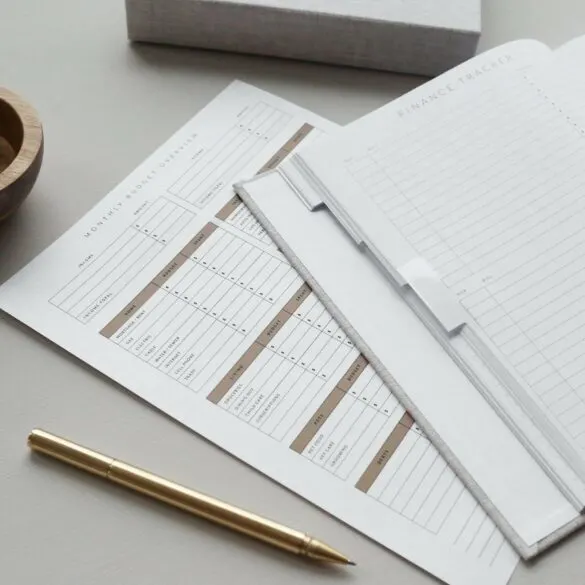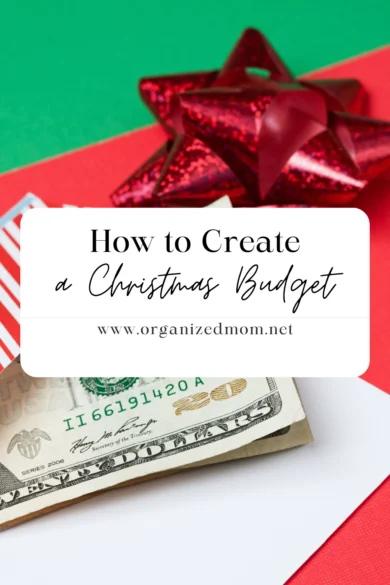It’s the perfect time to start preparing and planning for Christmas and the holiday season, and Organized Mom is here to help you get ready. Today we’ll be going over the reasons why creating a Christmas budget is important, and how to create one that is simple and easy to follow.
Creating a Christmas Budget
The holiday season is often called “the most wonderful time of year.” It’s the perfect time of year to create family memories, carry on traditions, and express our love to those closest to us.
But the holiday’s can also be stressful. There are often more demands on our calendars and on our wallets this time of year than any other time.
One of the best things you can do to keep the stress out of the holidays is to create a holiday budget.
Spending your energy worrying about money is the last thing you want to do when trying to create loving family memories.

Why Should You Create A Holiday Budget?
There’s a misconception that budgets are only for people who are financially struggling, but that’s just not true! Everyone needs a budget.
A budget is just a tool that allows you to plan for purchases and expenses, and to track your money with ease.
A holiday budget will allow you to know exactly how much you can spend, and where your money is actually going.
A budget will allow you to know what you can say “yes” to this holiday season without the added stress of financial uncertainty.
What Expenses Should You Plan For?
One of the first questions you’ll have when creating your Christmas Budget is, “What expenses should I plan for?”
That answer will be different for everyone. But to help you create your own budget, I’ve created a list of the basic categories you might be spending money on this holiday season:
General Idea of Holiday Expenses:
Family Gifts: This is the holiday gifts for the kids, your spouse, and extended family.
Friends Gifts: It’s nice to be able to give to our friends.
Co-worker Gifts: Does your work or your spouse’s work do a gift exchange?
Neighbor Gifts: Often something small or maybe just a treat to eat.
Travel Expenses: Some families might be flying across the country to be together for the holidays. Or maybe you’ll be driving a few hours to visit your parents or your in-laws? Either way, it’s important to prepare for some travel expenses.
Holiday Dinners and Desserts: It doesn’t feel like the holidays without the traditional holiday menu and treats. Are you going to be in charge of Christmas dinner this year? Or maybe you always make sugar cookies with your kids? Either way, you’ll want to plan to spend a little extra at the grocery store.
Wrapping Essentials: Wrapping paper, gift bags and boxes, ribbons and tags. You’ll want to plan to spend a little bit on making Christmas look nice.
Christmas Décor: Do you purchase a yearly Christmas ornament? Or maybe your string of lights isn’t holding up? Plan on spending a little bit of money on Christmas decor.
Sales: Sometimes items will go on sale on Black Friday that you want to stock up on, but you don’t necessarily want to include them as a Christmas gift. These could be things like wardrobe essentials, socks etc.
How Much Money Should You Spend?
The answer to how much money to spend on the holidays will be different for every family.
It all depends on three things.
- 1. How much money you’ve been able to save throughout the year.
- 2. How large your family is.
- 3. How well you can shop the sales and deals.

Make Your List and Check it Twice
Now that you have a general idea of your holiday expenses, it’s time to create your “Gift List” and budget.
You can create your holiday budget in a planner, with paper and pen, or you can create a digital one.
You’ll want to create a “Gift List” of every single person you want to purchase a gift for and how much you plan on spending on them. And then create a second column of how much you actually spent. Because sometimes we end up spending more or less than we originally anticipated.
Track Your Spending and Adjust as Needed
After setting up your Holiday budget, the most important thing is to keep track of your spending. It’s best to update your budget after every shopping trip or online transaction.

You’ll find that your Christmas budget is always changing throughout the weeks.
For example, let’s say you’ve budgeted to spend $50 on your in-laws, but you were able to get their gifts on sale and got everything you needed for them for $35. Then you can take the remaining $15 and either purchase them another gift, or put that $15 towards someone else’s gift.
The important thing to remember is not to overspend on the total amount you’ve put aside for your holiday budget.
What if Your Budget is Too Tight?
It can be frustrating to find that your budget is too tight, and you’re not able to purchase all the things you’d like.
You may have to make adjustments to your expectations.
Are there any traditions you can do for slightly cheaper? Like maybe instead of paying to see Christmas lights, you can find a neighborhood that decorates all out and you can drive through it for free?
If you’re looking for fun Family Christmas Activities to try this year, then check out our post here.
Christmas Fund for Next Year
If you’re struggling to stick to your current Christmas budget, and you find yourself wishing that you had more to spend, then I would suggest creating a Christmas Fund for next year.
What is a Christmas Fund?
A Christmas Fund is a savings account you set up specifically for Christmas, and every payday you deposit a small amount. For example you could deposit $25 dollars a check and if you get paid twice a month you would be saving $50 a month. After twelve months you’d have an extra $600 dollars for your Christmas budget next year.
It’s best to start saving for next Christmas in January. Can you imagine how much less stressed you’d feel if you didn’t have to worry about how you’re going to pay for Christmas?
If you want more ideas on saving money, be sure to check out our Financial Hack to make life a little less stressful.

